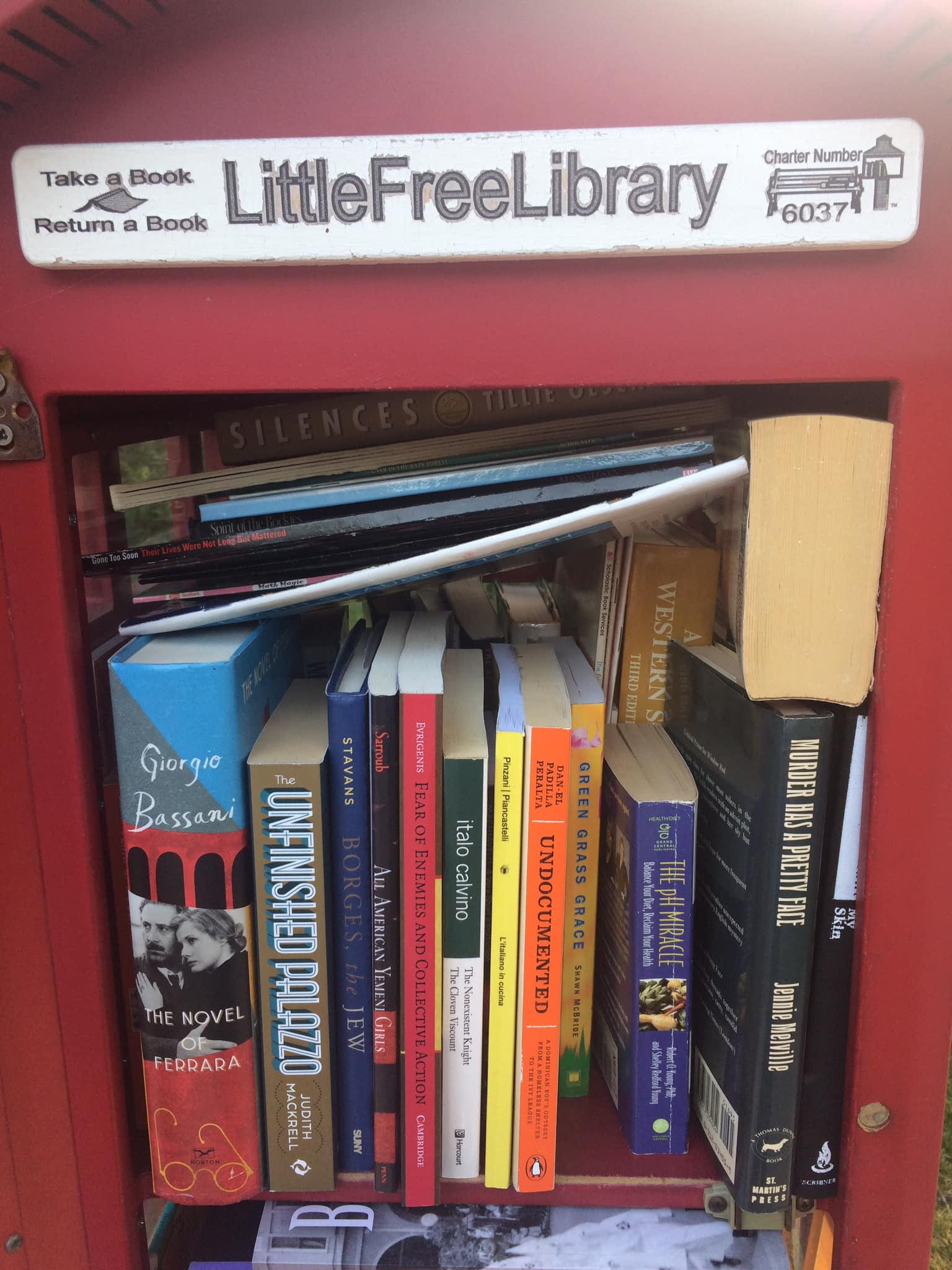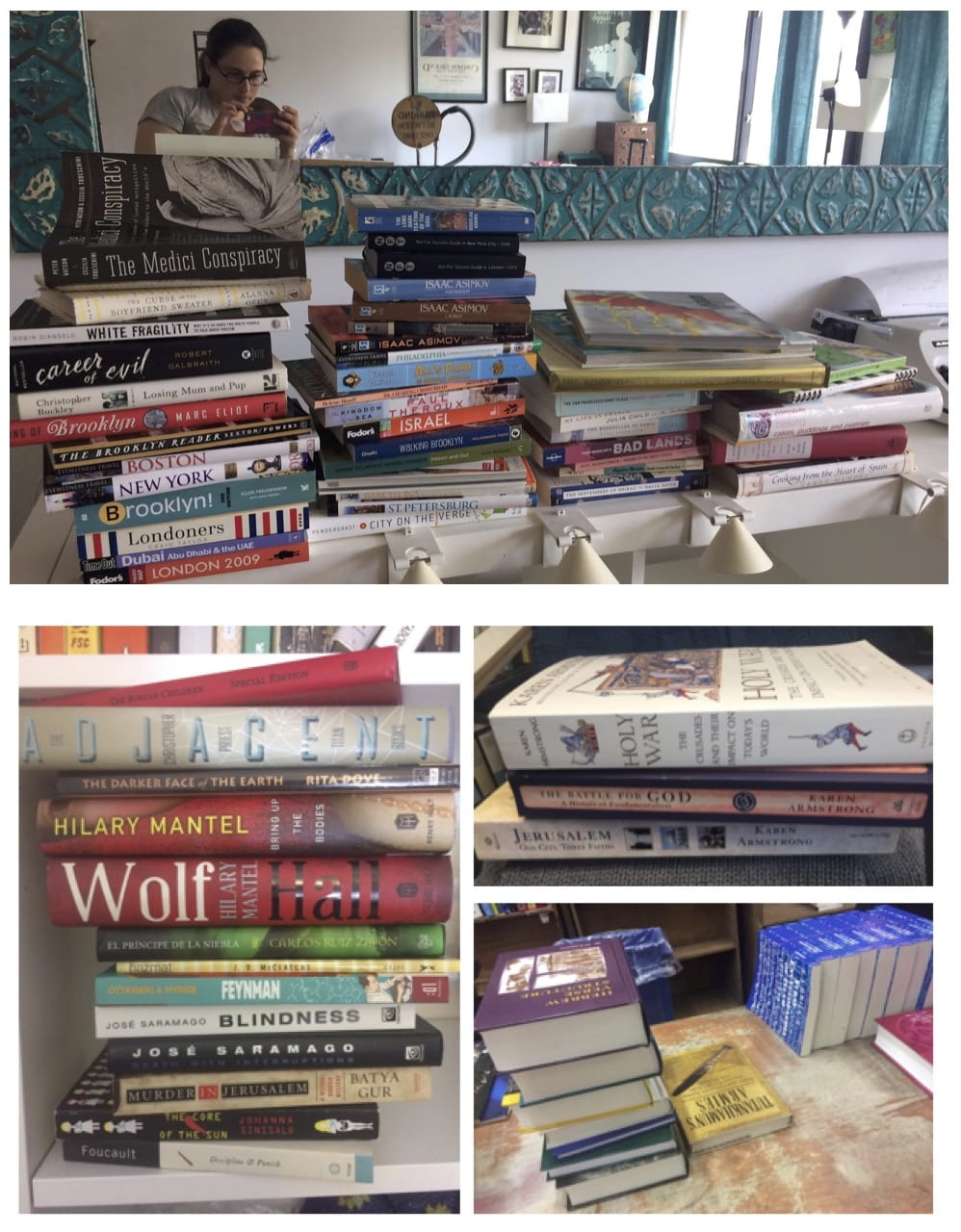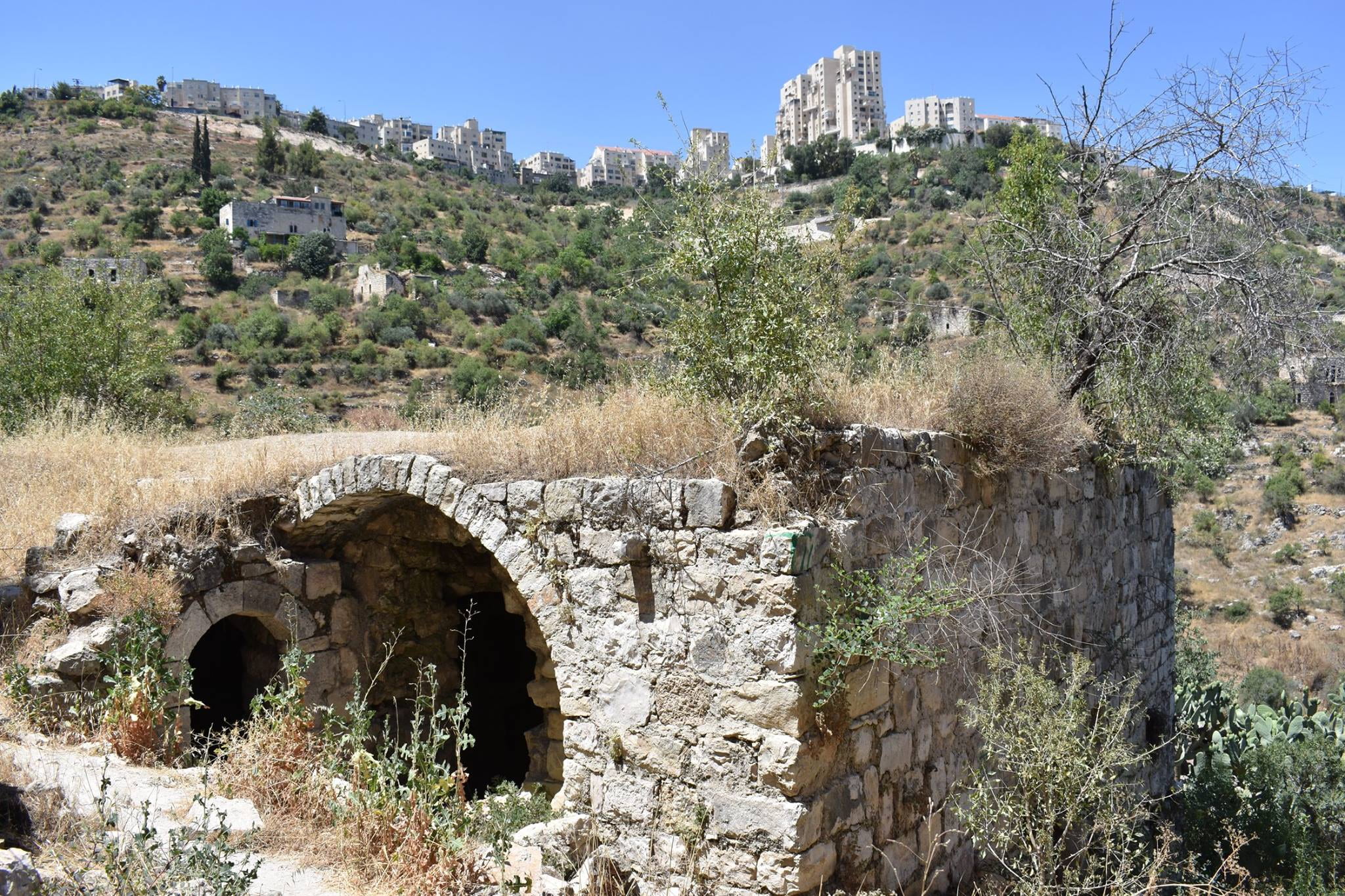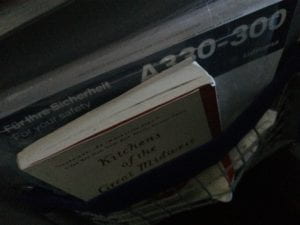Normally I don’t include my academic reading in my year-end roundup, but I wanted to keep track of what I accomplished on my sabbatical so I have a running list already prepared. I didn’t end up reading exactly what I expected. I thought that I would sit and read a lot of Arabic text since I had time to work without interruption. However, I found that just coming off of finishing the book that has had me tied to my desk chair since 2011-12, I didn’t just didn’t want to sit at my desk. It wasn’t that I didn’t want to work or to read, but I wanted to not be in a desk chair at a desk. I read out of doors and, since the weather was mostly disgusting in the summer and then, suddenly, freezing, with very little in between, on my couch in my living room. The little table-sitting that I did was devoted to working on a translation project that is ongoing. I didn’t have the wherewithal for another semester of all-day desk-sitting, so I translated in the morning and read, took notes, and wrote while sitting on the couch in the afternoons. Like translating, reading medieval Arabic text is a desk activity, and so it just didn’t happen that much; it was one or the other in terms of desk time and I wanted to make some progress on that project, which had stalled while I finished my book. Realistically, I was also just mentally exhausted from finishing the book and tenure, and reading text is a taxing activity; certainly far moreso than reading scholarship. In a certain respect, keeping this list has gotten me to think about habits of reading and the physicality that governs them. I thought that the long stretch of time would be good for reading text, but it was actually better for reading scholarship precisely because of how I was prepared to sit or not sit after years of a very specific kind of sitting. I’m hoping that now that I’m back to teaching, where I’ll have blocks of time where I’m on my feet, blocks of time where I’m prepping classes (which I can do anywhere), and blocks of time in meetings — that is, I’ll have lots of different physical modes of being at work — that I’ll be able to put in an extra hour or two of desk time, both physically and mentally. (I’m also hoping this doesn’t sound completely bonkers.)
With that said, here’s the mostly-complete list of what I read this semester with an eye toward reading widely and starting to think about the intellectual setting and framework for my next book:
Altschul, Nadia and Kathleen Davis, ed. Medievalisms in the Postcolonial World: The Idea of “The Middle Ages” Outside Europe. Baltimore: The Johns Hopkins University Press, 2009.
Benor, Sarah Bunin. “Jewish English,” in A Handbook of Jewish Languages, ed. Lily Khan. Leiden: Brill, 2016. 130-7.
—. “Do American Jews Speak a ‘Jewish Language’?: A Model of Jewish Linguistic Distinctiveness,” Jewish Quarterly Review 99:2 (2009): 230-69.
Bishop, Chris. Medievalist Comics and the American Century. Jackson: The University Press of Mississippi, 2016.
Calderwood, Eric. “Franco’s Hajj: Moroccan Pilgrims, Spanish Fascism, and the Unexpected Journey of Modern Arabic Literature,” PMLA 135:5 (2017): 1097-1116.
Coope, Jessica. The Most Noble of People. Ann Arbor: University of Michigan, 2017.
Dangler, Jean. Edging Toward Iberia. Toronto: University of Toronto Press, 2017.
Derrida, Jacques. “Like the Sound of the Sea Deep Within a Shell: Paul de Man’s War,” Critical Inquiry 14:3 (1988): 590-652.
Dockray-Miller, Mary. Public Medievalism, Racism, and Suffrage in the American Women’s Colleges. New York: Palgrave Macmillan, 2017.
Efron, John M. German Jewry and the Allure of the Sephardic. Princeton: UP, 2016.
—. “Scientific Racism and the Mystique of Sephardic Racial Superiority,” The Leo Baeck Institute Year Book 38:1 (1993): 75-96.
Guichard, Pierre. Los reinos de taifas: Fragmentación política y esplendor cultural. Málaga: Editorial Sarriá, 2005.
Hernández Cruz, Victor. In the Shadow of al-Andalus. Minneapolis: Coffee House Books, 2011.
Herman, David. “Narrative Worldmaking in Graphic Life Writing,” in Graphic Subjects: Critical Essays on Autobiography and Graphic Novels, ed. Michael Chaney. Madison: University of Wisconsin Press, 2011. 231-43.
Hever, Hanan. Suddenly, the Sight of War. Stanford: UP, YEAR.
Horn, Dara. “The Future of Yiddish in English,” Jewish Quarterly Review 96 (2006): 471-80.
Judt, Tony. A Grand Illusion?: An Essay on Europe. New York: UP, 2011.
León, María Teresa. Doña Jimena Díaz de Vivar: Gran señora de todos los deberes. Madrid: Castalia, 2004 reprint.
—. La Historia tiene la palabra: Noticia sobre el salvamiento del Tesoro artístico de España. Madrid: Endymion, 2009.
Marx, Karl. “On the Jewish Question,” in The Early Writings. New York: Penguin.
Moretti, Franco. Distant Reading. New York: Verso Books, 2013.
Muñoz Molina, Antonio. Córdoba de los omeyas. Madrid: Seix Barral, 1991.
Nirenberg, David. Anti-Judaism.
Ozick, Cynthia. “America: Toward Yavneh,” in What is Jewish Literature?, ed. Hana Wirth-Nesher. Philadelphia: Jewish Publication Society, 1994. 20-35.
Rashid, Hussein, “Truth, Justice, and the Spiritual Way: Imam Ali as Superhero,” in Muslim Superheroes: Comics, Islam, and Representation, ed. A. David Lewis and Martin Lund. Boston: Harvard University Press, 2017.
Ravitzky, Aviezer. The Roots of Kahanism: Consciousness and Political Reality. Jerusalem: The Hebrew University of Jerusalem, 1986.
REDACTED, Prof. Dr. REDACTED. REDACTED: A book I reviewed in manuscript, confidentially, for a press. REDACTED: REDACTED Press. Forthcoming, inshallah, 2018.
Rein, Raanan. “Echoes of the Spanish Civil War in Palestine: Zionists, Communists, and the Contemporary Press,” Journal of Contemporary History 43:1 (2008) 9-23.
Rennger, N.J. “The neo-medieval global polity,” in International Relations: Theory and the Politics of European Integration, ed. Morten Kelstrup and Michael Williams. New York: Routledge, 2000. 57-71.
Rodríguez, Ana A. “Mapping Islam in the Philippines: Moro Anxieties of the Spanish Empire in the Pacific,” in The Dialectics of Orientalism in Early Modern Europe, eds. Keller, Marcus and Javiero Irigoyen García. New York: Palgrave Macmillan, 2017. 85-100.
Rosser-Owen. Maryam. Islamic Arts from Spain. London: V&A Publishing. YEAR?
Roth, Laurence. “Innovation and Orthodox Comic Books: The Case of Mahrwood Press,” Multi-Ethnic Literature of the United States 37:2 (2012): 131-56.
Salgado, Minoli. “The Politics of Palimpsest in The Moor’s Last Sigh,” in The Cambridge Companion to Salman Rushdie, ed. Abdulrazak Gurnah. Cambridge: UP, 2007. 153-68.
Schirmann, Jefim. “Samuel Hanagid: The Man, the Soldier, the Politician,” Jewish Social Studies 13:2 (1951): 99-126.
—. “The Wars of Samuel Ha-Nagid,” Zion
Schorsch, Ismar. “The Myth of Sephardic Supremacy,” The Leo Baeck Institute Yearbook 34:1 (1989): 47-66.
Stein, Sarah Abrevaya. “Sephardi and Middle Eastern Jewries Since 1492,” in The Oxford Handbook of Jewish Studies, ed. Martin Goodman, et al. Oxford: UP: 2002. ##.
Tabachnick, Steven E, ed. The Cambridge Companion to the Graphic Novel. Cambridge: UP, 2017.
—. The Quest for Jewish Belief and Identity in the Graphic Novel. Tuscaloosa: The University of Alabama Press, 2014.
El-Tayyib, Fatima. European Others: Queering Ethnicity in Postnational Europe. Minneapolis: University of Minnesota Press, 2011.
Unamuno, Miguel de. Gramática y glosario del Poema del Cid. Madrid: Espasa-Calpe, 1977.
Viguera Molins, María Jesús. “El Cid en las fuentes árabes,” in Actas del Congreso Internacional El Cid, Poema e Historia, ed. César Hernández Alonso. Burgos: Ayuntamineto de Burgos, 2000.
Wilson, G. Willow. “Machina ex Deus: Perennialism in Comics,” in Graven Images: Religion in Comic Books and Graphic Novels, ed. A. David Lewis. New York: Continuum Publishing, 2010. 249-56.
Zihri, Oumelbanine. “A Capitve Library Between Spain and Morocco,” in The Dialectics of Orientalism in Early Modern Europe, eds. Keller, Marcus and Javiero Irigoyen García. New York: Palgrave Macmillan, 2017. 17-31





 Thought I would be okay taking these books on a trip and leaving them behind but definitely wasn’t: The Cooking Gene by Michael Twitty; The Library Book by Susan Orlean
Thought I would be okay taking these books on a trip and leaving them behind but definitely wasn’t: The Cooking Gene by Michael Twitty; The Library Book by Susan Orlean